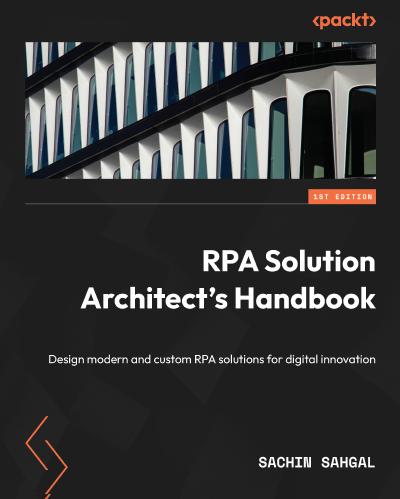English | 2023 | ISBN: 978-1803249605 | 302 Pages | PDF, EPUB | 10 MB
Drive digital transformation by increasing efficiency and ROI for your organization as a robotic process automation (RPA) solution architect
Key Features
- Learn architectural design and analysis of enterprise-wide RPA systems with real-world use cases
- Explore tips and best practices to deliver scalable business outcomes through RPA implementation
- Overcome challenges in intelligent automation, data, and security while building RPA solutions
RPA solution architects play an important role in the automation journey and initiatives within the organization. However, the implementation process is quite complex and daunting at times. RPA Solution Architect’s Handbook is a playbook for solution architects looking to build well-designed and scalable RPA solutions.
You’ll begin by understanding the different roles, responsibilities, and interactions between cross-functional teams. Then, you’ll learn about the pillars of a good design: stability, maintainability, scalability, and resilience, helping you develop a process design document, solution design document, SIT/UAT scripts, and wireframes. You’ll also learn how to design reusable components for faster, cheaper, and better RPA implementation, and design and develop best practices for module decoupling, handling garbage collection, and exception handling. At the end of the book, you’ll explore the concepts of privacy, security, reporting automated processes, analytics, and taking preventive action to keep the bots healthy.
By the end of this book, you’ll be well equipped to undertake a complete RPA process from design to implementation efficiently.
What you will learn
- Understand the architectural considerations for stability, maintainability, and resilience for effective RPA solution design
- Interact with cross-functional teams for seamless RPA implementation
- Write effective RPA documentation, non-functional requirements, and effective UAT scripts
- Demo RPA solutions, receive feedback, and triage additional requirements based on complexity, time, and cost
- Design considerations for intelligent automation and learn about RPA as a service
- Explore best practices for decoupling, handling garbage collection, and exception handling
Resolve the captcha to access the links!
